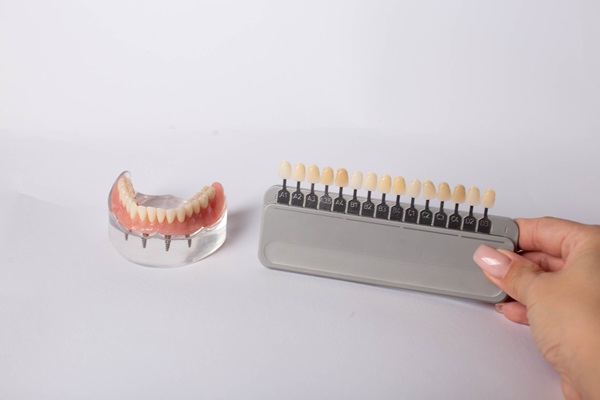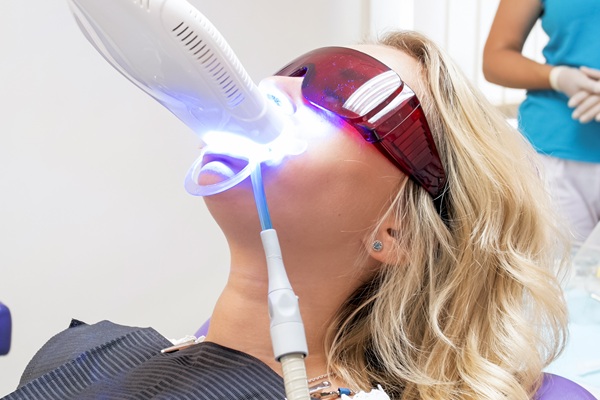Implant-Supported Dentures Can Solve the Problem of Missing Teeth

Implant-supported dentures are an excellent choice for patients who want a durable and easy option for replacing lost teeth. This restoration allows patients to enjoy their favorite meals once again and go about their regular activities with the denture securely in place. There is no need to worry about the dentures slipping or coming loose while speaking or eating. This will not only prevent embarrassment but also make life more bearable without a denture irritating your gums.
What are Implant-Supported Dentures?
Traditional dentures are supported with natural suction, adhesives, or metal clips. Over time, the fitting slacks because the gums diminish naturally with aging, making the dentures uncomfortable and unstable. With implant-supported dentures, this problem is solved because they are securely held in place, and the fitting will remain the same for several years.
As the name implies, implant-supported dentures are supported by implants. Implants are tiny titanium posts that surgically inserted into the jawbone to replace the root of a tooth. The mechanism of this restoration entails using the implants as the foundation for a set of prosthetic teeth. The denture is still a set of dental crown connected to an acrylic material, but the fitting is entirely different. This mechanism makes implant-supported dentures a more reliable alternative than traditional dentures.
The benefits of Implant-supported dentures
As mentioned earlier, they are more stable, but how is that possible? Aside from being the base on which the dentures sit, dental implants also help stimulate blood circulation around the gum and jaws to keep them alive. Blood circulation typically diminishes after a tooth is lost, leading to atrophy. The gums start to deteriorate, causing regular dentures to loosen after a few years. Inserting the implant into the jawbone keeps the gum stable, ensuring that the dentures stay tight after several years.
Implant-supported dentures can also withstand a stronger bite force, allowing the patient to eat a wider variety of foods without fear of denture slip. The result of the procedure is a dental restoration that is not only reliable but makes it possible to eat tougher foods instead of soft diets.
Getting implant-supported dentures
The process of getting this dental restoration starts with a consultation with the dentist. The dentist will examine the patient’s oral cavity to determine if this type of denture is suitable. Eligible candidates have to be in good health, free of oral health diseases and have enough healthy jawbone mass to support the implants.
The dentist will proceed to insert the implants through a simple dental surgery. Patients will need little recovery time, but a temporary denture will be provided before the permanent denture is ready. When the jawbone has fully healed, the patient will need to return to get the permanent restoration. The denture connects to the implants with a metal bar or rounded retainer.
Final note
Once the implant-supported dentures are in place, the patient will have a fully functional and beautiful-looking dental restoration that will last for several years. If you are missing multiple teeth, book an appointment with the dentist as soon as possible.
Request an appointment here: https://bloomfield.ismiledentalcarenj.com or call iSmile Dental Care of Bloomfield at (862) 702-5234 for an appointment in our Bloomfield office.
Check out what others are saying about our dental services on Yelp: Implant Supported Dentures in Bloomfield, NJ.
Recent Posts
All-on-4® dental implants are a popular teeth replacement option for a number of reasons. But how do you know if All-on-4 is right for you? Of course, the best person to ask is a dentist. However, if you are considering this option, here is an overview of what you can expect from All-on-4.All-on-4 replaces a…
For those struggling with excessive tooth loss or loose-fitting dentures, the All-on-4® treatment method can provide a speedy and long-lasting solution. The procedure involves attaching dentures to a set of strategically placed implants for increased security and stability. In addition, this approach offers a host of other benefits for patients with missing teeth.While crowns and…
All-on-4® is one of the many types of dental implants available. It involves the use of four specially-placed implants to support a full-mouth tooth prosthetics. After the procedure, patients often wonder what foods they can eat, especially since every step can affect recovery.In the next few days or weeks after the procedure, patients need to…
All-on-4 dental implants are currently taking the dental field by storm. These devices address periodontal diseases or tooth loss. They are supported by four dental implants, which gives the name of All-on-4.Dental implants have been revolutionizing the face of the dental industry over the last 25 years. Implants are small posts that replace the tooth’s…


